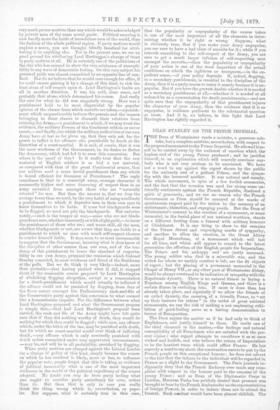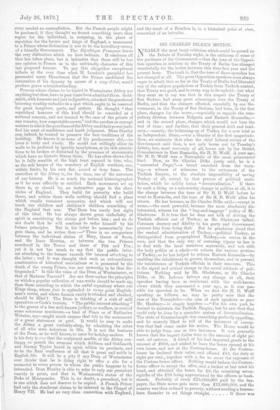DEAN STANLEY ON THE PRINCE IMPERIAL.
THE Dean of Westminster made a mistake, a generous mis- take, but a complete mistake, nevertheless, with respect to the proposed monument to the Prince Imperial. He allowed him- self to be carried away by the outburst of emotion which the hapless end of the young Prince produced ; and he justifies himself, in an explanation which will scarcely convince any- body who is not very anxious to be convinced. We have not a word to say against the regret shown by the public for the untimely end of a gallant Prince, and the sympa- thy with the bereaved mother. It was natural and seemly. The whole movement, in spite of a few foolish accessories, and the fact that the occasion was used for airing some un- friendly sentiments against the French Republic, disclosed a spirit of generosity, and we see no reason why the French Government or Press should be annoyed at the marks of spontaneous respect paid by the nation to the memory of an unfortunate, blameless, and engaging youth. But the Dean of Westminster's consent to the erection of a monument, or some memorial, in the burial-place of our national worthies, stands on a different footing from a funeral with military honours at Chislehurst. It is one thing to show to the remains of the Prince decent and ungrudging marks of syne.pathy, and another to allow the erection, in the Great Abbey or Royal Mausoleum, of a monument which will last for all time, and which will appear to record to the latest generation the affection of the English people for Imperialism. The Prince and his unhappy end are justly mourned. The young soldier who died in a miserable war, and the widow for whom no earthly comfort is left, are the fit objects of regret ; but the placing of a permanent memorial in the Chapel of Henry VII., or any other part of Westminster Abbey, would be always construed to be indicative of sympathy with the Napoleonic dynasty. There is no natural fitness in laying a Napoleon among English Kings and Queens, and there is a certain fitness in excluding him. If more is done than has already taken place, and especially if we allow the friends of an exiled dynasty, the enemies of a friendly Power, to "set up their banners for tokens" in the midst of great national monuments, we run the risk of making a not unpleazing exhi- bition of good-feeling serve as a lasting demonstration in favour of Bonapartism.
The Dean argues the matter as if he had only to think of Englishmen, and justify himself to them. He omits one of the chief elements in the matter,—the feelings and natural susceptibility of all Frenchmen who are satisfied with the pre- sent re'gime ; who regard attempts to overthrow it as at once wicked and foolish, and who believe the return of Imperialism to be the heaviest curse which could afflict France. He has scarcely a word to say about the construction sure to be put by the French people on this exceptional honour ; he does riot advert to the fact that the tribute to the individual will be regarded in France as a slight to the Government. The Paris journals in- dignantly deny that the French Embassy ever made any com- plaint with respect to the honour paid to the remains of the young Prince; and as Dean of the Diplomatic Corps in London, Musuras Pasha has publicly denied that pressure was brought to bear by the French Ambassador on the representatives of foreign Powers, in order to induce them not to attend the funeral. Such ccsiduot would have been almost childish. The story needed no contradiction. But the French people might be pardoned, if they thought we tneant something more than regret for the individual, in assigning, in the place of
sepulchre for the heroes and kings of England, a monument to a Prince whose distinction it was to be the hereditary enemy of a friendly Government. The Ripublique Fran game draws the very distinction which we here indicate. It condones all
that has taken place, but it intimates that there will be but one opinion in France as to the unfriendly character of this last proposed honour. To pay this altogether exceptional
tribute at the very time when M. Louduu's pamphlet has persuaded many Fcenchmen that the Prince meditated the restoration of his dynasty by means of a coup d'e'tat, would produce grave misunderstanding.
Persons whose claims to be buried in Westminster Abbey are anything but clear, have in past times been admitted there. Gold- smith, with humane and just indignation, attacked the practice of Interring wealthy nobodies in a spot which ought to be reserved for great lawgivers, poets, and °raters. He thought " that sepulchral honours of this kind should be conceded as a national concern, and not trusted to the care of the priests of any country, how respectable Beeves," and the careless or corrupt manner in which the guardians of the Abbey used their power justi- fied his want of confidence and harsh judgment, Dean Stanley can, indeed, be trusted to preserve the best traditions of the building. He knows it as none of his predecessors did,—he loves it truly and wisely. He would not willingly allow its walls to be profaned by ignoble inscriptions, or its rich associa- tions to be broken or disturbed by the presence of monuments which have no historic fitness there. He has often shown that he is fully sensible of the high trust reposed in him, who, as the sole keeper of the cemetery of English worthies, can, within limits, by his own fiat, accord or deny fame. The custodian of the Abbey is, for the time, one of the narrators of our history. He is as much the national historiographer as if he were officially so entitled. Each monument set up there is, or should be, an instructive page in the chro-
nicles of England. They build for posterity who build there, and within these walls nothing •should find a place which recalls transient memories, and which will not teach our children and children's children something of the England that was. The' Dean has rarely lost sight of this ideal. He has always shown great catholicity of spirit in considering the claims put before him ; and we do not doubt that he will continue to order himself by his former principles. But in his letter he momentarily for- gets them, and he writes thus :—" There is no comparison between the individual claims of Mary, Queen of Scots, and Sir Isaac Newton, or between the two Princes murdered in the Tower and those of Pitt and Fox ; yet it is not too much to say that the public inter- est attaching to the former exceeds the interest attaching to the latter ; and it was thought that such an extraordinary combination of historical associations as is presented by the death of the young Prince, was not unworthy to be thus dis- tinguished." Is this the voice of the Dean of Westminster, or that of Madame Tussaud ? Arc not these rather the principles on which a popular collection of wax-works should be made up, than those according to which the awful repository where our Kings sleep, where finis is apiiended to every great English- man's career, and where human vanity is rebuked and abashed, should be filled? The Dean is thinking of a visit of mill operatives or Cook's tourists. "The public interest attaching" to the graves of a few well-known jockeys, or seullers, or even of some notorious murderers—a bust of Peace or of Katharine Webster, say—might much surpass that felt in the monument of a great statesman or poet. It would be easy to make the Abbey a great curiosity-glop, by admitting the ashes of all who were notorious in life. It is not the business of the Doan, as he well knows, to cater for holiday-makers. It is his duty trysiu that the sculptural marble of the Abbey con- tinues to preach the sermons which Addison and Goldsmith and Jeremy Taylor heard in spirit within its precincts, and to be the final confluence of all that is great and noble in English life. It will be a pity if any Dean of Westminster ever thinks that he is doing right to offer a site for a memorial to every person in whom the public happens to be interested. Dean Stanley is able to refer to only one precedent exactly in point, and that is, Westmacett's statue of the Duke of Montpensies. This is, no doubt, a precedent, but it is one which does not deserve to be copied. A French Prince had only the slenderest claims to be interred in the Chapel of Henry VII. He had no very close connection with England,
and the tomb of a Bourbon is, in a historical point of view, somewhat of an intruder.



































 Previous page
Previous page